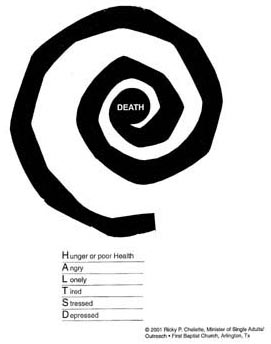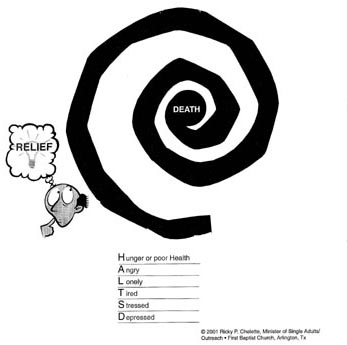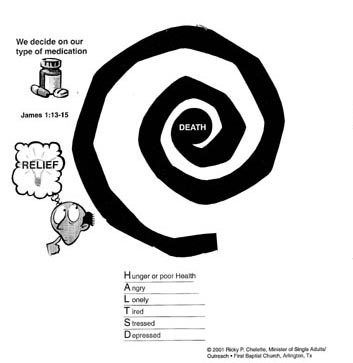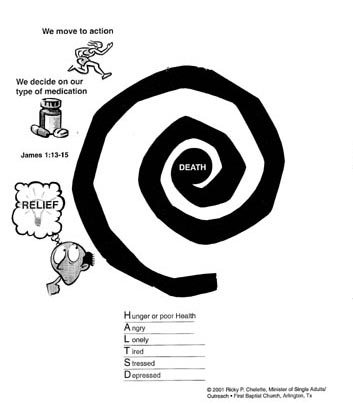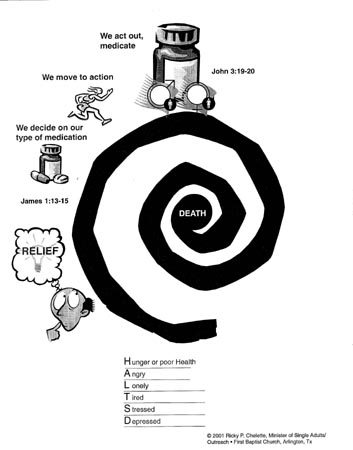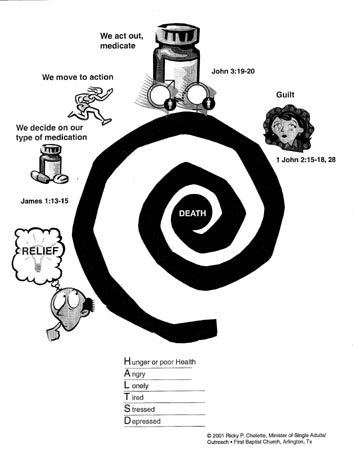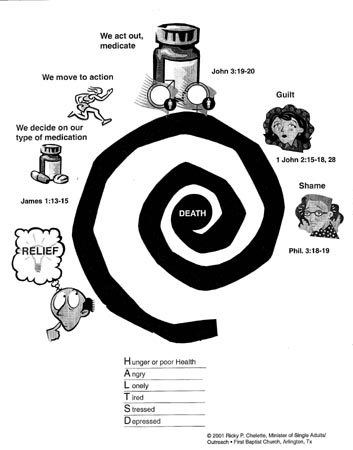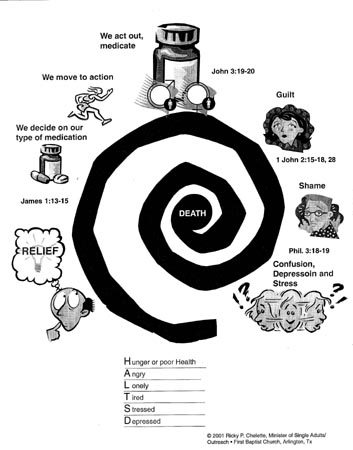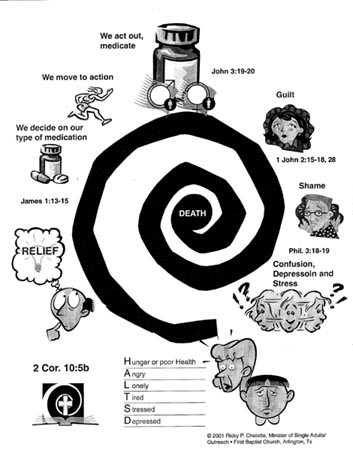Dungeons and Dragons is a fantasy role playing game (or FRPG). Role playing in and of itself can be a useful exercise of the imagination, such as helping kids practice saying no to drugs or alcohol when offered them at a party, or learning to set boundaries by practicing with a part of one’s support group. Fantasy can also be a legitimate exercise of the imagination, and learning to distinguish fantasy from reality is an essential part of maturing intellectually. The problem comes when the values and content in the fantasy affect a person adversely.
In this way, D&D or any other FRPG can be compared to rock music: the genre itself is not inherently evil or dangerous, but the content (lyrics, in the case of rock music) is what makes the difference. (For more on that concept, see Jerry Solomon’s article “Rock Music” on our website.)
The content of D&D and its effect on players are worth examining.
Worldview
In contrast to a Christian worldview, D&D was created with a magic worldview (and this has not changed over the years). Rather like “the force” of Star Wars, magic is a neutral force, something like gravity, that pervades reality. Characters learn to use magic to manipulate the universe to get what they want. It’s a very mechanistic universe, like a vending machine where you insert your coin and out comes a productonly in this universe, people use spells and magical instruments to manipulate the magic toward their desired end. Magic can be used for good or evil.
Two insightful writers, Brian Onken and Elliot Miller, offer a responsible analysis of D&D and FRPGs in general in a paper from Christian Research Institute, “Fantasy Games People Play.”{1} They point out that many proponents of D&D try to draw a parallel between their game of choice and the Christian fantasy of J.R.R. Tolkien in Lord of the Rings. There are some common elements, but it’s the great differences that are a real problem, differences which proponents of FRPGs “either ignore or rationalize away. Christian fantasy works by Tolkien, Lewis, and others are accepted and considered to be a good use of fantasy because they offer a reflection of an essentially Christian world view.”{2}
“Though the creators of Dungeons and Dragons may have borrowed many aspects from Tolkien’s ‘middle earth,’ one part they did not consider was the overall setting in which everything took place and from which everything derived its ultimate meaning Tolkien’s Christian world view. As a result, the game’s world view does not represent the moral universe God created. In place of the creator God, its universe is governed by a multiplicity of gods and demigods. Moreover, its universe is not infused with an absolute, inherent morality. The more thoroughly one investigates the writings of Tolkien, Lewis, and others and compares them to FRP games, the more one will see that there are not only crucial differences in the theological and moral perspectives but also in the context and motives of their respective inventors. Furthermore, there are important differences in the kind and extent of participation required in each (e.g., the cultivation of fantasy in the participatory amoral milieu of Dungeons and Dragons versus the passive moral universe of Tolkien).”{3}
The worldview of D&D is anti-biblical because it presents a universe without a transcendent, good God. The deities of D&D are mythical, like the ancient pantheon of the Roman gods and goddesses.
Morality
Because most FRPGs pit good against evil, some of their proponents point to the games as moral. But their overall morality is pragmatic (what works to get what you want) at best and amoral at worst.{4} “[T]he universes created in fantasy role-playing games generally tend to be confused on the issue of morality. Though they have borrowed many aspects of Tolkien’s ‘Middle Earth,’ the makers of Dungeons and Dragons and other FRP games have not created theistic ‘universes.’ Rather, their universes are generally governed by a multiplicity of gods and demigods. While in a theistic universe, good is determined by the attributes of God Himself, in FRP worlds good and evil are presented as equal and opposite impersonal poles, and the gods as well as the creatures may align themselves with either. Since there is no supreme God, and since good does not ultimately triumph over evil, many players eventually find themselves preferring to play evil roles; fewer demands are placed on them that way. “Cornerstone [magazine] quotes Rett Kipp, a college student who plays FRP games forty hours a week: “‘In D&D it’s better to be evil. You get more advantages being evil, and it’s easier to go on and not have to think of what to do and what not to do. If for some reason you had the idea in your head that you no longer trust someone, if you chop him down from behind as an evil character there’s no penalty for it…’”{5}
Time-eating Monster
You can find any number of family members who have watched FRPGs gobble up their loved ones as they spend hours every day, or each week, engrossed in “their game,” either online or in real life. Students have flunked out of school because they didn’t go to class or do their homework. People have lost their jobs because they were more committed to playing their game than keeping their commitments at work. And nobody knows how many relationships have collapsed because people were consumed by their games to the exclusion of all else. The popular online game “EverQuest” has been aptly nicknamed “EverCrack” by many players.{6}
Brian Onken writes, “In a world where more and more demands are made on our time and there seems less and less time available to accomplish the tasks at hand, Dungeons & Dragons (and other fantasy role-playing games) is indeed a creature with a voracious appetite. One of the main requirements of the game is time, and lots of it. Gary Gygax, the originator of Dungeons & Dragons, says: ‘the most extensive requirement is time.’{7}
“As advocates of the game get more involved it has a tendency to become a sort of time eating monster in and of itself. After playing the game with her family, a New West magazine researcher noted that, ‘Good or evil, it becomes a compulsive force in the lives of those who play.’{8} “What is the problem here? Well, we are exhorted to ‘walk, not as unwise men, but as wise, making the most of your time, because the days are evil’ (Eph. 5:15, 16). In the light of such words, a fantasy game with a ferocious appetite for time is hardly the wise way to walk. To play one will require a tremendous amount of time, and since no one wants to play badly, perhaps such time consumption would best be exchanged for more profitable pursuits.”{9}
Bill Schnoebelen, who spent years in the occult before coming to Christ, says, “Remember, as a Christian, we are exhorted to bring ‘into captivity every thought to the obedience of Christ’ (2 Cor. 10:5). How can this be done with so many hours being spent in a game which never mentions Christ and pushes the very sorcery He forbids?”{10}
Blurred Reality
While many people have no trouble distinguishing between reality and fantasy, some FRPG players are sucked into what could be called “reality distortion.” Players sometimes begin to think of their characters as real people with separate existences. (This is not limited to FRPG, however. I know of one person so caught up in the Left Behind series that she fell asleep thinking about the characters and action in the book she was reading, and upon waking, found herself praying for a character in crisis! And many fans of TV shows don’t really “get it” that the actor who plays a character has a real-life, different existence from the one he or she plays on TV. Not to mention the many letters the author of the Harry Potter books has received from children begging for acceptance into the Hogwarts School of Witchcraft and Wizardry!)
One Dungeon Master (the person with the most control and power in a D&D game) noted that sometimes, when a player’s character gets killed, the game player sometimes suffers psychic shock and may go into depression.{11}
Magic and the Occult
Whether the discussion is Harry Potter or D&D, the objection inevitably arises that this is make believe, it’s fiction, and fairy-tale magic doesn’t exist in the real world, so what’s the big deal?
Elliot Miller of CRI points out, “We must agree that there is a fundamental difference between actually attempting to work magic, and only pretending to do so (this point has not been sufficiently recognized in some of the Christian reviews). However real this distinction may be in the minds of the players, though, I feel no assurance that the spirit world will not respond when it is beckoned.”{12}
Others experienced in spiritual warfare have observed that the very real demonic realm are quite legalistic and literal: when anyone opens a door to them, they will come through it! Most people are completely oblivious to the reality of their choices opening a door to the demonic, but the consequences catch up with them. This is one reason God has said that all forms of magic are an abomination to Him (Deut. 18)out of His loving desire to protect us.
Miller continues, “Though the possibility of actual contact with the satanic realm through role-playing cannot be denied, my greatest concern is that FRP involvement can create a predisposition toward actual occult activity. There are certain needs and desires which draw people to FRP in the first place. Many sensitive teenagers and adults continually bombarded with evolutionary theories and naturalistic philosophies, seek through FRP an escape from the cold, mechanistic view of the universe which they’ve been led to believe is ‘reality.’ Who wouldn’t prefer an adventurous existence in a magical, purposeful world over the complex, impersonal ‘real world’ being pushed on young people by our educational institutions and the media?”{13}
I would suggest that that “predisposition toward actual occult activity” is indeed, a door propped open for demons to enter in. When players’ views of magic and occultic exercises of power (even pretend) are shaped to see them in a positive, friendly light, they are accepting the very things God condemns. They are buying a lie, and intentionally or not, embracing rebellion against one of God’s absolutes. Internalizing lies and rebellion provides a place for the Enemy to gain first a foothold (Eph. 4:27) and then a stronghold (2 Cor. 10:4-5).
So the occultic magic element of D&D and any other FRPG can be spiritually dangerous.
Bill Schnoebelen says, “Even if you have no intention to ‘do magic’ when you play D&D, you are immersing yourself in an alien, magic worldview which can gradually change the way you think about life and spiritual matters.”{14}
But what about the magic in the works of Tolkien and Lewis? That kind of fantasy magic is different because the worldview of the literature is biblical, and consistent with the world God made. Behind all the magic is a good, transcendent, holy God. Magic doesn’t have a life and power of its own, as a force to be manipulated. Furthermore, the magic in the books of Tolkien and Lewis and other Christian fantasy writers is viewed passively by the reader. In D&D, the player is immersed in the story, and actively uses occult magic as part of the game.
Lust for Power
Elliot Miller writes, “The human craving for power is also given an avenue for expression in FRP games. . . The various magical abilities that players exercise in these imaginary worlds can also whet their appetites for power. The same young man who is unable to prevent his parents from separating, or to make the cute blonde in his history class notice him, can, through FRP, conquer a kingdom or obtain immense treasure simply by casting a spell.
“What happens, then, when the inevitable occurs and this young man is befriended by someone who can introduce him to the occult world? He will discover that practices he has enjoyed in his fantasy world actually go on in the real world. He would like nothing more than to believe that he can divine the future, project his soul outside of his body, perform healings, or cast a spell and get results. The transition from make-believe sorcery to actual sorcery would not be all that difficult. Once he encounters the real power that exists in the occult world, he will happily accept the magical world view of occultism in place of the naturalism he had absorbed.”{15}
Bill Schnoebelen makes an excellent point about the lust for power: “Make no mistake about it, magic and sorcery ARE spiritual. It does not matter if they are ‘make believe’ magic or not. It is the mind that is the battleground. I just recently had a D&D player who professed Christ tell me that everything he did had Christ in it, because Christ lived in him, even as he was playing D&D. While that may be true of a Christian, the question needs to be asked: is Christ pleased with what His servant is doing? “I used the metaphor of a porn role-playing game, where the participants play acted in various forms of sexual sin such as fornication, adultery or homosexuality. There was no actual sexual touching involved among the players, nor any nudity required. It was all in the mind. Would Jesus be pleased with that? “See, most of us can understand that concept better because most of us are more familiar with the power human sexuality can have over our minds. It is one of the most powerful forces God created within us. Yet, what most Christian gamers do not understand that magic is a kind of spiritual lust. Allowing the concepts of magic and sorcery into our minds awakens within us a kind of sexual itch that has no definable source or cause. It is, however subtle, an itch for power. Magic, at its root, is about power and about rebellion. It is about not liking how God runs the universe and thinking you can do a better job yourself.
“Now of course, we are not saying that everyone who plays D&D is going to end up a sorcerer or a Satanist. But we are saying that being exposed to all these ideas of magic to the degree that the game requires cannot but help have a significant impact on the minds of the players, no matter if they are Christian or unbeliever, and no matter what the ‘template.’
“This is not just chess, football or bridge. This is a game that envelops the player in an entirely different fantasy world in which the power of magic and violence is pervasive. It is a game with a distinct and seductive spiritual worldview that is diametrically opposed to the Bible. Yes, sorcery appears in the Bible. But it is NEVER in the context of a good thing to do. It is always presented as something dangerous and utterly contrary to the will of God.
“The question still stands. Why would a Christian wish to involve themselves in such a game?”{16}
Heart Issue
Onken and Miller offer this insightful analysis of the heart issue:
“[N]either fantasy nor fantasy role playing is wrong in and of itself. When carried out within the context of the Christian world view, it can serve as a useful and creative activity. We are creatures made in the image of an imaginative God, and we should consider it a privilege to possess and exercise this precious gift of imagination. But we must also realize our obligation before God to use this gift in a wholesome way, and to guard against any misuse.
“Discerning the difference between a wholesome use and misuse begins with the question, ‘To what end or for what purpose (is the imagination) being exercised in a particular direction?’ This certainly appears to be the question Jesus had in mind in His Sermon on the Mount when He stated, ‘Every one who looks on a woman to lust for her has committed adultery with her already in his heart’ (Matthew 5:28). “If Jesus taught that lust is tantamount to adultery (which God condemns see Deuteronomy 5:18, 22:13-27), would He approve of the deliberate cultivation and enjoyment of fantasy regarding other things that God condemns? Obviously not. To fantasize about those things that God has forbidden in His Word (immorality, the occult, the pursuit of other deities all elements of Dungeons and Dragons) is tantamount to doing them. This cannot be understood in any other way than a misuse of our God-given imagination.
“With the Bible as our guide, this is what we as Christians must guard against ‘so that [we] may walk in a manner worthy of the Lord, to please Him in all respects’ (Colossians 1:10).”{17}
Notes
1. “Fantasy Games People Play,” Christian Resource Institute, http://www.equip.org/free/DD401.pdf
2. Ibid, p. 2.
3. Ibid., p. 2-3.
4. “Should a Christian Play Dungeons and Dragons?”, William Schnoebelen, www.chick.com/articles/frpg.asp.
5. “Fantasy Games People Play,” p. 7.
6. “When Games Stop Being Fun,” April 12, 2002, http://news.com.com/2100-1040_3-881673.html
7. Gary Gygax, Dungeons and Dragons, basic manual. TSR Hobbies, Inc., 1979, 3. Quoted in “Fantasy Games People Play,” p. 4.
8. Moira Johnston, “It’s Only a Game Or Is It?”, New West, (August 25, 1980), 34. Quoted in “Fantasy Games People Play,” p. 4.
9. Fantasy Games People Play, p. 4.
10. Should a Christian Play Dungeons and Dragons?, op.cit.
11. John Eric Holmes, “Confessions of a Dungeon Master,” Psychology Today (November 1980), 89. Cited in “Fantasy Games People Play,” p. 4.
12. Fantasy Games People Play, p. 5.
13. Ibid.
14. Should Christians Play Dungeons and Dragons? Op cit.
15. Fantasy Games People Play, p. 5-6.
16. Should Christians Play Dungeons and Dragons? Op cit.
17. Ibid., p. 3.
© 2005 Probe Ministries
